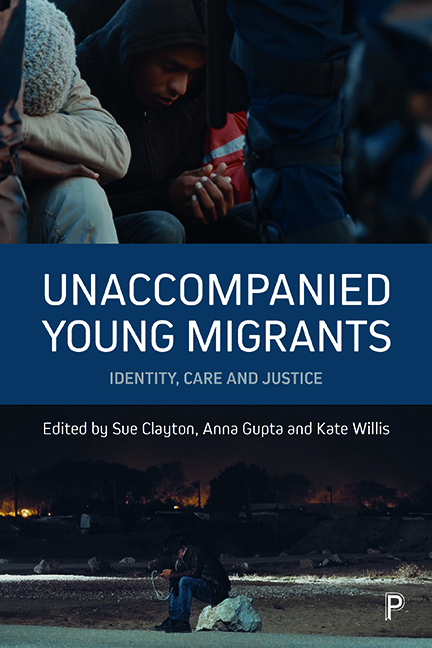one - Migration regimes and border controls: the crisis in Europe
Published online by Cambridge University Press: 21 April 2022
Summary
Introduction
The protection of unaccompanied young migrants seeking asylum, some of the most vulnerable people within the estimated 244 million people who are currently living outside their country of birth (International Organization for Migration, 2016), is encompassed in a number of key international agreements. According to Article 14 of The Universal Declaration of Human Rights, ‘Everyone has the right to seek and to enjoy in other countries asylum from persecution.’ This right is also embedded in the 1951 UN Refugee Convention (see Chapter Two). Additionally, the 1989 United Nations Convention of the Rights of the Child (UNCRC) provides an important framework for recognising children as independent social actors, but requiring child-sensitive approaches and protection. However, ‘there is no single instrument in international law that sets out the full range of obligations that a state owes in respect of a refugee child’ (Pobjoy, 2017: 22). Thus, despite these global level agreements, and perhaps also reflecting the lack of a single coherent regulation, how such instruments are implemented and experienced by migrants varies greatly, reflecting significant differences in the migration regimes adopted by individual states and groups of states.
This lack of coherence – for our concerns here, both within Europe, and beyond European borders – makes it extremely difficult for non-governmental organisations (NGOs) and other actors to assess and secure what provision can be made available to unaccompanied young migrants seeking asylum, and we would argue causes a great deal of unnecessary suffering as they either do not access their rights or are considerably delayed in doing so. Recent changes in Europe, including the 2016 EU/Turkey and the 2017 Italy/Libya agreements have further complicated the situation on the ground for the thousands of unaccompanied minors in Europe (see Amnesty International, 2017: 25–6, for discussion of implications of the EU/Turkey deal for unaccompanied children in Greece).
Such difficulties are predicated on contradictions inherent in the evolution of the state itself. Reece Jones, in his 2016 book Violent Borders, highlights the constructed nature of states: ‘States have not always existed. Along with nations, borders and territories, they were created to address problems of control that emerged over the past 5,000 years’ (Jones, 2016: 4).
- Type
- Chapter
- Information
- Unaccompanied Young MigrantsIdentity, Care and Justice, pp. 15 - 38Publisher: Bristol University PressPrint publication year: 2019



